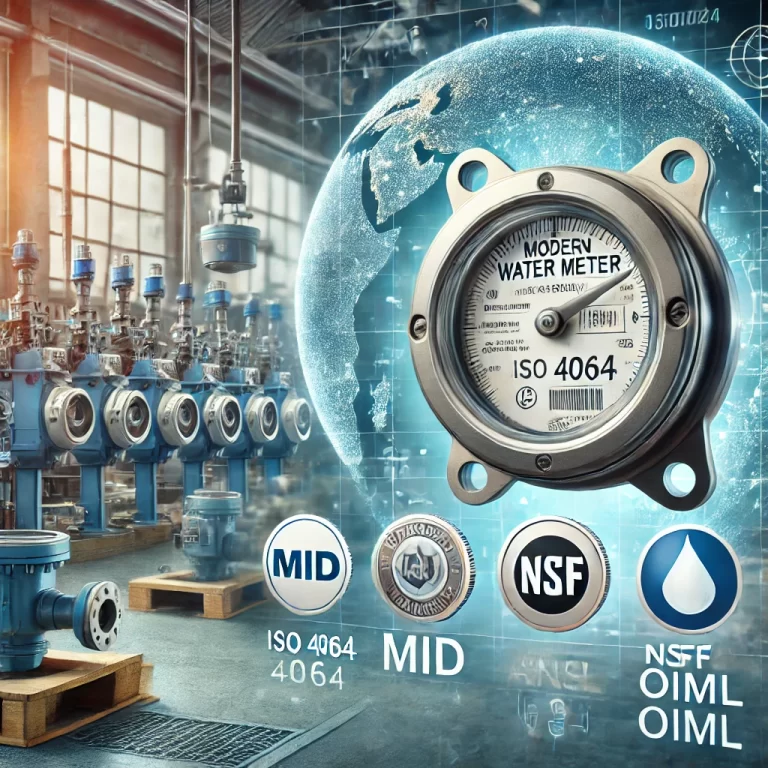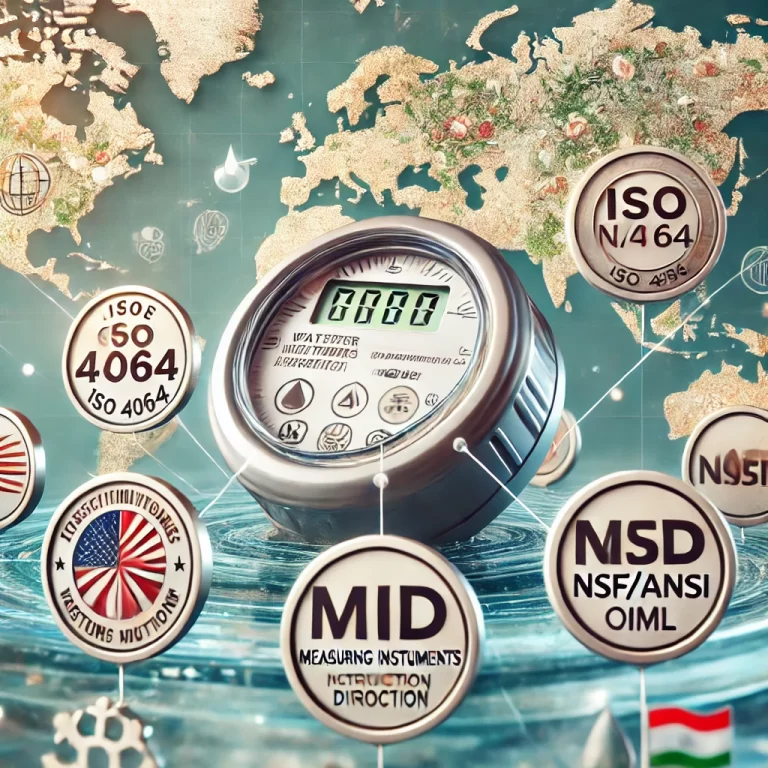Water meter export certification plays a crucial role in ensuring that water meters comply with international and local regulations, enabling them to be legally imported, sold, and used in foreign markets. Various certification standards guarantee that the water meters meet specific performance, safety, and regulatory requirements. This article provides a detailed breakdown of the most common certifications needed for exporting water meters worldwide.
1. ISO 4064 Certification: International Standard
ISO 4064 is the primary international standard for water meters, established by the International Organization for Standardization (ISO). This standard applies to all types of water meters that measure the volume of cold or hot water.
Key Requirements: ISO 4064 defines essential performance parameters, including accuracy, durability, and flow rate testing. It ensures that water meters provide reliable and precise measurements over extended periods. The standard also covers the construction of water meters, requiring them to resist wear, corrosion, and environmental factors.
Global Recognition: ISO 4064 certification is recognized worldwide, making it one of the most important certifications for water meter manufacturers looking to export to multiple countries. Compliance with this standard demonstrates that the product meets international quality benchmarks.

2. MID Certification (Measuring Instruments Directive)
In Europe, the MID (Measuring Instruments Directive) certification is mandatory for water meters intended for the European market. The MID, established by the European Union, regulates all measuring instruments, including water meters, to ensure their accuracy and reliability across the entire EU.
Key Components: The MID ensures that water meters meet strict accuracy requirements, including environmental conditions and mechanical integrity. Certification covers both design and production, meaning manufacturers must pass rigorous quality checks for their entire production process. MID-certified water meters must also comply with electromagnetic compatibility (EMC) standards to ensure that external electrical noise does not affect their performance.
Legal Requirement in the EU: Without MID certification, water meters cannot legally be sold or used in EU member countries. This certification enables products to circulate freely across the European Economic Area (EEA), which includes all EU countries as well as non-EU members such as Norway and Switzerland.
3. NSF/ANSI Certification: North American Market
For water meters that come into contact with potable (drinking) water, especially in North America, NSF/ANSI certification is essential. NSF International, in collaboration with the American National Standards Institute (ANSI), sets strict public health standards for products interacting with drinking water.
Health and Safety Standards: NSF/ANSI certification focuses on ensuring that the materials used in water meters do not leach harmful contaminants into drinking water. It also sets criteria for the design, performance, and durability of water meters, ensuring they operate safely in various conditions.
Application in North America: This certification is particularly important for manufacturers looking to enter the U.S. or Canadian markets. Compliance with NSF/ANSI standards is often a legal requirement in many U.S. states and cities and helps water meter manufacturers build consumer trust by demonstrating their commitment to safety and quality.
4. OIML Certification (International Organization of Legal Metrology)
The International Organization of Legal Metrology (OIML) is a global organization that develops harmonized metrology standards for measuring instruments, including water meters. OIML certification ensures that products meet precise and uniform standards of accuracy.
International Trade: OIML certification is especially valuable for manufacturers targeting multiple international markets. Many countries, particularly in Asia, Africa, and South America, adopt OIML standards, making this certification a crucial step for expanding into emerging markets. OIML-compliant water meters must undergo extensive testing to verify their accuracy and long-term performance under various environmental conditions.
Benchmark for Accuracy: OIML-certified meters are recognized for their precise measurement capabilities and high-quality manufacturing processes. This certification helps water meters gain acceptance in markets where accuracy is a regulatory requirement, especially in industries like utilities where precise billing is essential.

5. Other National Certifications
In addition to international standards, many countries have their own national certifications and standards for water meters. These certifications ensure compliance with local laws, often complementing broader certifications like ISO, MID, or NSF/ANSI.
NMI Certification (Australia): The National Measurement Institute (NMI) in Australia sets specific requirements for water meters sold in the Australian market. NMI certification ensures that water meters meet stringent accuracy and performance standards, tailored to local conditions such as climate and water quality.
AWWA Standards (United States): The American Water Works Association (AWWA) has its own set of standards for water meters in the United States. AWWA certification often applies to large-scale commercial and industrial water meters, setting guidelines for meter accuracy, material quality, and durability.
GCC Certification (Gulf Cooperation Council Countries): For manufacturers targeting the Middle East, particularly Gulf Cooperation Council (GCC) member states like Saudi Arabia, the United Arab Emirates, and Qatar, GCC certification ensures compliance with regional requirements for metering devices. This certification often considers local environmental conditions such as extreme heat and sand exposure.
6. Key Considerations for Manufacturers
Water meter manufacturers seeking export certification must understand both the technical and regulatory requirements of each target market. Key considerations include:
Performance Testing: Almost all certifications require extensive performance and accuracy testing under different flow rates, temperatures, and environmental conditions.
Production Process: For certifications like MID and OIML, the manufacturing process itself must be compliant. Regular audits may be required to ensure ongoing conformity with the certification standards.
Local Variations: While international standards like ISO 4064 or OIML provide broad acceptance, some markets demand additional local certifications that take into account specific environmental or regulatory factors.
Documentation: Manufacturers must maintain proper documentation, including test reports, technical drawings, and manufacturing procedures, to obtain and retain certification.
Conclusion
Achieving the appropriate export certification for water meters is critical for manufacturers looking to expand into global markets. Compliance with standards like ISO 4064, MID, NSF/ANSI, and OIML ensures that water meters meet international quality benchmarks and can be legally sold in key markets. By understanding the specific requirements for each certification, manufacturers can ensure their products are well-prepared to compete globally, meeting both performance and safety standards.
